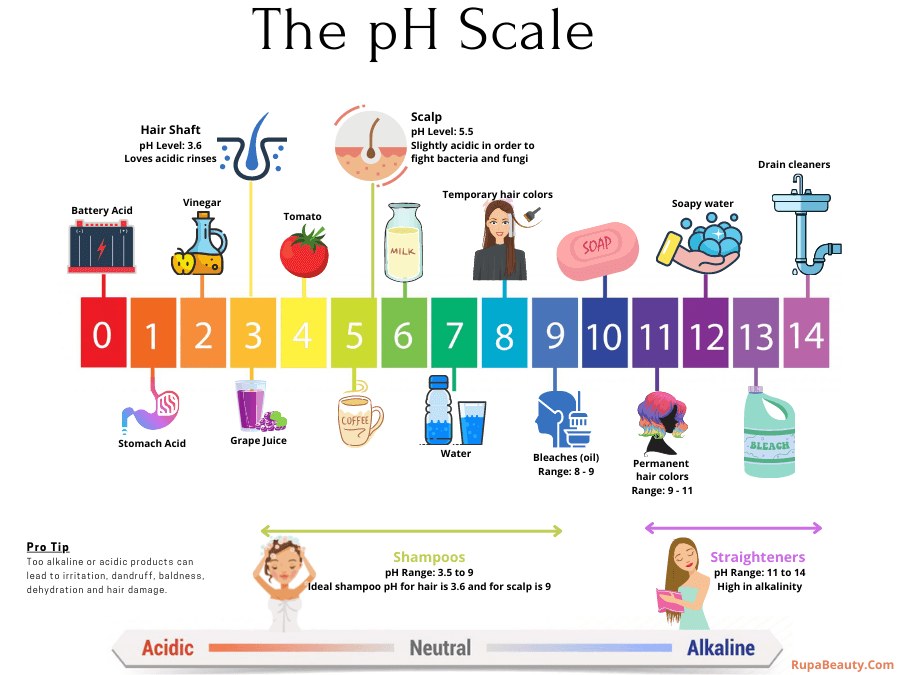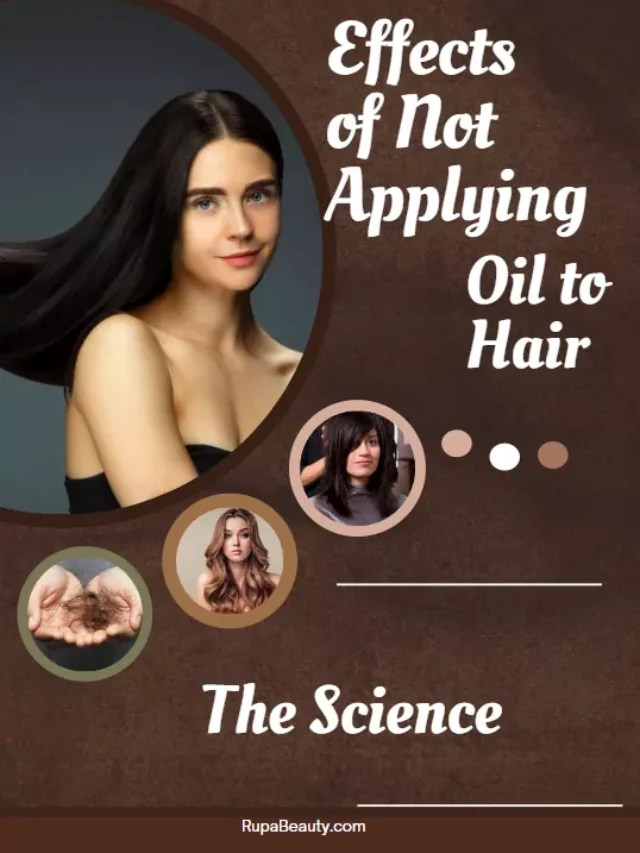Ever wondered, what do we oil our hair, and what are the effects of not applying oil to hair? Today we will look into the science and identify if it’s beneficial or actually harmful for your hair.
Hair oiling is the practice of pouring oil onto hair and massaging it into the scalp to increase moisture, luster, and shine. Hair oiling may soften the hair and provide vitamins and minerals that get stripped from frequent washing. This practice has been used in almost all countries for centuries and is recommended in Ayurvedic medicine.
Table of Contents
Effects of Not Applying Oil to Hair
In few circumstances not applying oil to your hair may actually be more harmful than beneficial.
Sebum, not oil, is the substance that coats your scalp. The excessive production of sebum may result in bacterial infection, which can lead to dandruff as well as other scalp issues. So, if you have a healthy production of sebum in your scalp, not applying oil won’t have any adverse effects.
However, if your scalp and hair are dry, then not applying oil for longer time may make it more dry and brittle.
Hair oiling can actually cause hair loss if it is not done correctly. It is possible that too forceful massage may induce root deterioration. Furthermore, overdoing the oil may result in an overly greasy head of hair. Folliculitis and boils are both caused by a buildup of sebum in the pores of the scalp. Oil can also make your dandruff worse if you already have it on your scalp. At the end of the day, excessive oil may weigh down the hair strands, making them look lifeless and dull.
Oiling your scalp is an excellent method to provide your hair with beneficial vitamins, minerals, and fatty acids. These components contribute to the nourishment of your scalp, the stimulation of hair development, and the preservation of moisture. By not applying oil you will deprive your hair of these benefits.
When should you avoid Oiling your Hair?
If you have an oily scalp, you should avoid oiling your hair.
If you apply oil to your greasy scalp on a regular basis, you increase your chances of developing an infection. If you already have acne on your forehead, you should avoid applying oil to the area around your hairline and brow.
Hair has a naturally occurring pH level that is controlled by the scalp’s natural production of oil on its surface. Putting oil on the scalp may clog the follicles and lower the pH level, which is bad for hair growth. The pH level of your skin and scalp has a direct relationship with hair loss. If your scalp is too dry or very greasy, you will suffer increased hair loss. Extra oil applied to the scalp has the additional effect of disrupting nature’s intended water to oil ratio on the scalp. If you apply too much oil to it, your scalp will cease generating its own natural oil.

Scalp oils are not soluble in water, so even when you wash them off, they typically leave a residue on your skin and clothes. And when you walk out in the sun with that coating of oil on your hair, the sun warms up the oil’s layer on your scalp and hair, which in turn warms up the interior structure of the hair, causing all of the moisture to evaporate from the hair. This heats up your hair from the inside out. Although it seems to be glossy on the outside, when you touch it, it will feel like sandpaper.
In an era when hair was not exposed to many external influences such as pollution, preservative-laced food, chemicals, and treatments, applying oil to the hair was a sensible choice. This is something to keep in mind, and the next time you get an oil massage, be sure to wash your hair right away so it doesn’t attract any dirt.
When it comes to applying hair oil on top of other hair products, stay with what you’re using and avoid layering it with any hair oil products until you’ve washed your hair completely. In addition to causing your strands to lose their texture and quality, using oil on top of other chemical-infused hair treatments is a bad idea. Your hair will become dull, dry, and harsh as a result of this.
So in these scenarios, it is completely okay not to apply oil on hair.
Is Oiling Hair Necessary?
Oiling is not necessary unless your scalp’s sebum (natural oil) production is less than required.
When it comes to preserving hair from the effects of daily life, oils are very essential. Hair oiling on a regular basis helps to prevent moisture-induced exhaustion, which is the inflammation and dryness of the hair. Oils shield the hair follicles from irritants by filling the space between the cuticle cells of the hair follicle.
Oil is beneficial to the health of the scalp. It is beneficial to gently massage the scalp since it aids in exfoliating and, in certain cases, assists in decreasing hair fall.
Oils include fatty acids, which aid in the replacement of lipids in the scalp. Chemical treatments, hairstyle, and even pollution may cause these to be lost.
Lipids play a critical function in maintaining the appearance and feel of a healthy head of hair. They aid in the preservation of the luster and shine of hair.
Oil may assist to reinforce the hair shaft, which is particularly important in the event of frizzy or dry hair.
Does not Applying Oil Cause Hair Fall?
Not applying oil doesn’t cause hair fall.
Oiling does not aid in the prevention of hair loss, but in certain scenarios, it might serve to worsen it. Oiling causes a buildup of oil and dust on the scalp, which causes your hair follicles to get blocked, resulting in increased hair loss. Other face issues, such as acne, may result as a result of this.
Even expert hair spa treatments have little impact in reducing hair loss. Hair is damaged by the toxins used in spas. Although it temporarily softens your hair, it has a negative impact on the overall condition of your hair in the long term, according to research.
How do you remove oil from hair after oiling?
Including oils in your hair care regimen is a wonderful way to make your hair shinier, moisturize your scalp, and promote hair development, among other benefits. However, after the oil has been applied, it may be difficult to remove. Although you can usually eliminate oil from your hair by just washing and condition your hair, as usual, applying a clarifying shampoo may be even more beneficial.
If you want to effectively wash your hair, carefully massage a little quantity of shampoo into the roots and scalp of your hair. Avoid pulling on the strands with your nails or generating excessive friction on them. When you clean your scalp too hard, it may get irritated, causing it to generate even more oil.
Instead of concentrating on the hairline, concentrate on your scalp, which contains the oil. Avoid applying shampoo or scrubbing your hair’s ends immediately with a comb. Instead, just let the shampoo run through the ends of your hair as you wash it.
Summary
An excessively oily scalp may cause itching and seborrheic dermatitis, which are both unpleasant. Furthermore, it may serve as a food source for such fungus that produces dandruff. Having said that, you don’t want to completely remove all of your oil. Your natural oils help to preserve your hair and are essential for maintaining a healthy scalp and glossy locks.
Hair oiling is by far the most nutritious thing you can do for your hair, and it is very simple. In the same way that a facial stimulates blood circulation on your skin, hair oiling stimulates the circulation of blood in your scalp, which promotes hair growth. All you have to do is be gentle with your scalp and use your fingers or a cotton swab to aid in the penetration of the oil into your hair. Hair loss and damage are unavoidable if this is not done.

Creative, versatile, and passionate about her craft, Rupa Das is a well-recognized name in the world of fashion and makeup! This is a woman who has been in the fashion and makeup industry for 24 years and is still one of the leading international makeup artist in the circuit! She has worked in big brands like Lakme, Green Trends, Colors and transitioned to become a Beauty (Hair & Skin) Trainer.
